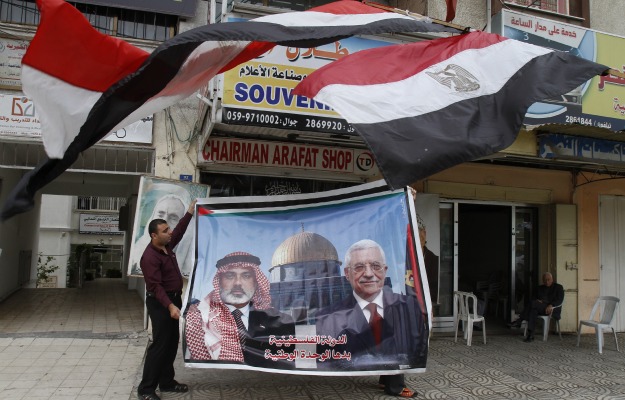![]()
Mon, May 09, 2011 | Rubin Reports | By Barry Rubin
Why The Palestinian Authority-Hamas Deal Is So Dangerous
The Fatah-Hamas decision to reconcile, form a joint Palestinian Authority (PA) government and hold elections seems to be a short-run maneuver that might have some very long-range consequences.
Fatah’s motive seems to be to have a united front when it goes to the UN in September to seek recognition of a unilateral declaration of independence. One of the arguments used to criticize its standing to make such a move has been the fact that the PA does not rule almost half the territory it is claiming.
For Fatah, it is also a popular move. A recent poll by Near East Consulting says that 89 percent of Palestinians want the dispute settled and believe it will help the Palestinian case at the UN.
But while September is the minimum time for this agreement to last, May 2012 is the maximum timeline. That is the approximate date set for new elections and the side that expects to lose would probably pull out of the pact. Hamas has no intention of yielding control over the Gaza Strip to a Fatah-dominated PA, while Fatah feels the same way about letting Hamas extend its control over the West Bank.
Which of the two groups is more popular? Ironically, it may be true that more Palestinians in the Gaza Strip, fed up with Hamas’ repressive rule and destructive policies, would vote for Fatah candidates than last time; while West Bank Palestinians, fed up with Fatah’s continuing corruption, might give more votes to Hamas.
On its side, Fatah’s election slogan could be that the PA has delivered relative prosperity; Hamas offers ideological and religious fervor.
There are, however, three big problems that the merger — if it is at all applied in practice — creates for Palestinian politics and for the peace process.
First, radicalization. Hamas has more advantages for radicalizing Palestinian public opinion, the PA, and Fatah than Fatah has for moderating Hamas. Hamas is a disciplined organization with a clear ideology. It has a strong social welfare component — albeit only to build its political base — and has not been caught in high-level corruption. Moreover, it can play the card of Islam and of militancy against Israel and the West.
There is also the question of whose cadre is better. Fatah might always be linked to the word “moderate” nowadays, conjuring up the image of responsible middle class gentry, while Hamas people seem like wild-eyed fanatics. Yet in practice, the average Fatah cadre often have a thuggish, opportunistic character while Hamas’ men are austerely puritanical. At least when they aren’t in power — as on the West Bank — they might seem more attractive on the street level.
True, Fatah has on its side West Bank prosperity and providing the people with greater stability. But it has not delivered a state. In the past, Hamas’ talking points have done better than those of Fatah.
Yet the issue is not mainly what the people think but what the activists think. Fatah people have defected to Hamas and Islamist ideas have developed within the Fatah militias. Groups that exist to fight admire the most energetic, effective fighters. The younger generation of Fatah people has worked alongside Hamas and doesn’t bear the hatred of its elders toward a rival group.
In addition, Hamas people can now demonstrate openly in the Fatah-ruled West Bank while Fatah rallies are banned in the Hamas-ruled Gaza Strip
Hamas’ sponsors have done better than Fatah’s sponsors. In fact, Fatah has no real sponsors in the Middle East. In contrast, Hamas is backed by Iran, Syria, the Muslim Brotherhood, and now the Egyptian government. These forces seem to Middle Easterners on both sides to be getting stronger at the expense of the United States and the West.
The second factor is the Western perception of the PA. The PA’s image is not enhanced by bringing into the government as an equal partner an organization rejecting peace with Israel and advocating genocide while extolling and committing terrorism. On top of this, Hamas is a client of Iran, Syria, and the Muslim Brotherhood — not great strategic friends of the West. Both Hamas and Fatah representatives met with the Muslim Brotherhood’s leader who told them that the winds of change blowing in Egypt placed the goal of liberating Palestine within reach.
Will Western governments be willing to give money to a regime that includes Hamas? One whose classrooms will teach that Israel should be destroyed and the Jews are subhuman? One very possibly containing a movement that continues to fire rockets and mortar shells into Israel? Already many congressional Democrats are calling for an aid cut-off.
The Obama Administration will ignore them but might there come a point when it can no longer do so?
Finally, there is a factor that exacerbates the first two points: How will this alliance affect PA policies?
A PA that has absorbed Hamas as part of the government will not be able to negotiate seriously with Israel. Indeed, set on the unilateral independence strategy, it will not want to talk seriously with Israel. On no issues — borders, security guarantees, Jerusalem, refugees — will it be able to make the tiniest compromise. It will certainly not reduce incitement to violence or terrorist attacks.
There is also the question of structural changes within the PA. Many within Fatah already want to get rid of Prime Minister Salam Fayyad, the man mainly responsible for the West Bank’s economic progress. Joined by Hamas partners, they would almost certainly succeed in forcing Fayyad out. If there are Hamas ministers, they will use their positions to bring their cadres into the government and turn the PA in a more radical and Islamist direction.
It should be stressed that for the PA to be a real partner for peace, one of the most important tasks would be to reinstall its (or, perhaps one might better say, Fatah’s) hegemony over Hamas. This is not at all what is happening now. Either the partnership will break down or it will make Hamas stronger, the PA more radical and, hence, unsuccessful in producing peace, prosperity, or progress toward an actual Palestinian state.
About the author,
Barry Rubin is director of the Global Research in International Affairs (GLORIA) Center, editor of the Middle East Review of International Affairs (MERIA) Journal, and a featured columnist at PajamasMedia http://pajamasmedia.com/barryrubin/ His latest books are The Israel-Arab Reader (seventh edition), The Long War for Freedom: The Arab Struggle for Democracy in the Middle East (Wiley), and The Truth About Syria (Palgrave-Macmillan). The website of the GLORIA Center is http://www.gloria-center.org/. His PajamaMedia columns are mirrored and other articles available at http://www.rubinreports.blogspot.com/.



 RSS
RSS












Why The Palestinian Authority-Hamas Deal Is So Dangerous | Middle East news, articles, opinion and a http://fb.me/XozvBDlL
RT @CrethiPlethi: Why The Palestinian Authority-Hamas Deal Is So Dangerous | Middle East news, articles, opinion and a http://fb.me/XozvBDlL